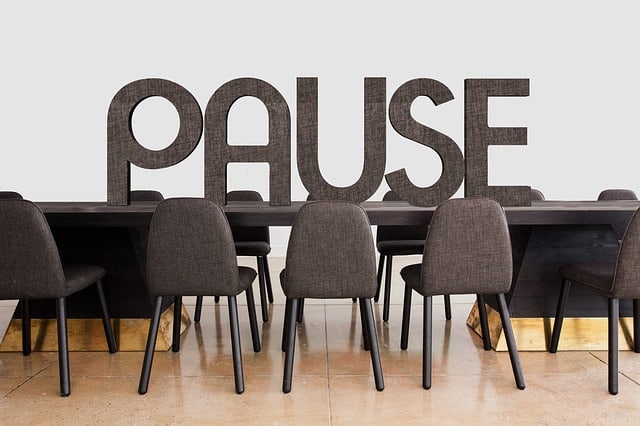Hello and happy New Year!
Sometimes certain aspects of French culture will leave foreigners scratching their heads. La Poste, anyone? French work culture falls into that category and is something I’ve barely touched on the blog. To give you some insight into what it’s like working with the French, I have a guest post from a reader named Richard who blogs over at Deep Heart of France and is on Facebook here. He worked for Michelin for many years and is now retired, and wow, his stories below on French work culture are worth a read. Show him some love in the comments!
What’s it like working with the French and what’s his take on French business culture? What follows are his words…
French business culture
I’ve been lucky enough to live in France twice, for a total of seven years. And even though we returned to the U.S. for 12 years between these expat assignments, I still moved back and forth freely between meetings with Americans and our colleagues in France, often several times a week on the phone and several times a year in person.
It’s not surprising, then, that there are some major cultural differences between French work culture and what you’d find in a more “Anglo-Saxon” business. These differences go deeper than the rituals of the morning handshake and the occasional glass of wine at lunch.
They can cause real misunderstandings and get in the way of being a good team member at work. Here are three of the most important French work culture differences:
“I think, therefore I discuss”
René Descartes is familiar to most of us for saying “I think, therefore I am” – but it didn’t take long for me to learn that his influence still permeates every corporate conference room in France. For my first project, we needed to choose a vendor to provide a fairly minor service. When the bids came in, everyone in the team read the proposals and as we talked around the coffee machine it was clear that we all preferred the same vendor.
Great! We’d just call Purchasing and ask them to finalize the contract.
Mais non… My new French colleagues explained to me that our hallway conversations were not adequate to make a decision. Although we all knew which vendor to choose, we needed to schedule an eight-hour meeting (which eventually lasted ten) to review and discuss each detail of the different proposals and document our reasoning for making the decision.
I’ve heard other American and English colleagues complain that this is an example of an innate French aversion to risk, or just plain “CYA” behavior – but in fact, I don’t think it’s that at all! The Cartesian method is present everywhere in the French approach to solving problems, and anyone with a business or engineering degree from a French university has been drilled in the process. It’s just how French business culture works.
Everything must be rationally deduced from indisputable facts, so you can’t consider a problem solved or a decision firm until you’ve gathered all possible facts, sorted and structured them, and documented the results so others can see what you’ve done.
In the last few years, there’s been some movement (at least in my company) to “be more like the Anglo-Saxons” and accelerate the process of decision-making. But the Cartesian method is still a powerful force of gravity for a French business, and anyone who doesn’t understand that risks to be known (as I was for a while!) as “le cowboy américain.”
“You are a moron, and I’d like to invite you for a beer”
Even more disconcerting to me about French work culture, at first, was the French propensity to argue in ways that might get you fired in an American or British company. I’ve heard some incredibly personal assaults carried out in front of big rooms full of people – “You don’t know the first thing about what you’re talking about!” “Did you find that idea in a dumpster?” Or even (most incredibly) “Come on, be a man!”
Most remarkably, these comments in the heat of an argument seem to be forgotten as soon as the next coffee break. (Or almost – I think the “be a man” remark crossed a line for the person at whom it was directed.) My French colleagues treat this heated form of discussion as an extension of the Cartesian process – one of the ways you test ideas and discard the ones that can’t survive the heat, I guess. And once I got the hang of it, I confess that it seemed like good sport to engage this way!
“Of course I know the answer; go ask my boss to make me tell you.”
This is actually a direct quote from someone I met during my second expat assignment in France. And it wasn’t intended in a hostile way; it just reflects a deeply-rooted respect for “the hierarchy” that persists in at least some French business settings. I needed a quick answer to a question, and I knew that a guy in another department had the data, so I went to him directly. My mistake? Not addressing my question first to his manager, who could then prioritize it and (if he agreed it needed answering quickly) direct his employee to give me what I needed. Working with French colleagues is not always so simple.
This is one of those things about French business culture that seems to be changing more rapidly than the others, but in 19 years of working with French colleagues in a French business, I’ll admit it’s the one difference that I had the most trouble with. The important thing, though, is to remember that “different” does not mean “bad.”
And adjusting to these differences is nothing compared to the incredibly rich and satisfying experience of learning to work effectively with people who have a different way of looking at the world.
The fact that it’s happening in France, where you can walk to work past a medieval cathedral, have a proper four-course lunch in the company cafeteria, and go home to a fine bottle of wine – well, that has been the biggest “bonus” of my life!
***
Thank you again to Richard for his guest post on French work and business culture. Be sure to visit his blog here.
What about you, has French work culture been challenging for you? What about working with French colleagues?
PIN this French work culture post:








Excellent article! I worked for an American company, but I encountered a few shocks dealing with the local employees. The biggest one was how every one of them seemed to know, down to a comma, the workplace legislation and their rights. There was no give and take. If a big project had to be done by a deadline, tough luck–they were not about to work even 15 minutes into their lunch hour to get it done and sent, even if finishing the project meant they could leave work early. Also, the office manager went around taking attendance of all the local hires. U.S. companies can be cold-hearted to their workers, but mine was pretty cool about illness and deaths in the family. An expat lost her sister and her father was nearly killed in a car accident; company policy was three days off for parents or children and one day off for a sibling. Obviously that wouldn’t even cover the trip. As long as the rest of the team was willing to do get her work done (without overtime or comp time), the bosses tolerated her absence for several weeks. The strict rule following is good for protecting workers, but in a case like this, it would have backfired.
It was true for me, too, that there was a heavy focus on workplace legislation and attendance monitoring, even for people in more “executive” roles. (I believe, though, that probably has a lot to do with the possibility of a government audit of company records to enforce the 35-hour law — something I’ll be writing about in the next few weeks.) Thanks for your comment!
I haven’t worked for a French company, but these insights into the French workplace are interesting. One thing I noticed as I arrived in Paris at the airport was a worker arriving and he stopped to greet each of his co-workers with kisses on cheeks or handshakes. I thought that was interesting because a nod and hello would be the most I would get in the States.
Hope you’ll consider playing along with Dreaming of France, which I post each Monday.
Thanks, Paulita. Yes, there’s a whole elaborate etiquette associated with coming into the office every morning and greeting your colleagues. The part I never mastered is that you’re only supposed to say “Bonjour” and exchange handshakes ONCE each day — if you forget and try to re-greet someone later in the day, they may put up their hands and say “on s’est vu” (“we’ve already seen each other today”). My memory was never good enough to remember who I’d already seen and who I hadn’t! Thanks for commenting!
Haha. I don’t work for a French company, but since living here this doesn’t surprise me in the least (especially the 10-hour meeting to discuss something already agreed!). Funny how differently things work here – very different to the typical kiwi ‘do-it-yourself’ attitude I’m used to back home 🙂
Thanks, Nadine!
So there are some pretty big differences aren’t there I am not a business person so don’t know what it would be like for Aussies but still I liked this post learnt something
Thanks for reading, Jo-Anne!
This is hilarious! Working in France is certainly an adjustment – even the realization that my boss was just staring at me when I asked, “Oh, what did you do?” after he said that he had a good weekend wasn’t because he didn’t understand, but that this was a “deeply personal question” came as a shock.
I had a co-worker tell somebody that she wouldn’t help translate because it wasn’t in her contract and I’ve been told that I should refuse to do certain work because it’s not in MY contract, so I have the right to say no. Since I’m cadre (but not dirigeant), I was also told to make sure I document every weekend day that I work because my working days are in my contract and when I hit that number of days, I no longer have to work! I’m not even sure I’m ALLOWED to work more than that number of days.
The fact that people can come in smelling strongly of alcohol after lunch and nobody says a word or even that drinking during lunch is perfectly acceptable are also differences. Or needing a cigarette being an acceptable reason to start a meeting 5 minutes late!
Thanks for your kind words. I also had the experience of encountering someone who felt that any question about life outside work was “too personal”…but that seems rarer and rarer to me now. (And I do think the overall attitude about alcohol during the work day has evolved rapidly in the last few years…by the time of our 2nd expat assignment in France all the wine and beer had been banned from the company cafeteria.)
I can so relate to this! I loved reading these anecdotes, and I like the attitude that it’s just a different style of doing things, that one way isn’t better than the other, and that we just have to adapt. (I have not always been able to adopt this attitude so gracefully myself, especially after verrrrry long meetings.) Thank you for sharing!
Thanks, Catherine! We certainly moved to France with the idea that there is no “better”, only “different” — and that helped make our lives there richer in many ways. (We also encountered a few expats who wanted to measure every experience in France against the benchmark of how it would be in their home country. Most of this group felt miserable much of the time.)
I can relate to everyone of those from my 10 year gig. Also the Cartesian thing that the analysis (no matter how complex) should be ideally synthesized into a tableau de bord. Actually that’s not a bad approach.
We also used to have a saying: An American says, “I understand the theory but how does it work in practice?” and the French say: “I understand the practice, but what is the theory?”
As for what can be “said” , I was surprised as well. I don’t know if things have changed, but in 1995 or so after a number of his key female staff have gone long maternity leaves (almost a year), a colleague actually said in a meeting full of lots of people (in a formal response to a question about handling the absences)- the next person I hire will be a man!
And then there is the dreaded “Inspection General”. Loosely translated “internal audit”. Hardly. More like a forensic, prosecutorial investigation.
I have a number of other stories but can’t post right now.
Todd, I agree about the synthetic tableau de bord — that’s something we continued to use on both sides of the ocean. And there is still an unsettling amount of overt sexism in the workplace, way more than would pass in the U.S., I believe. (One of my colleagues told me “I’m Latin so I’m allowed to say that.” !?) Thanks for adding to the conversation!
I hope I didn’t give the impression I didn’t enjoy working for the French. I certainly did. And I certainly agreed at time with their exasperation at some of their American employees – stereotypically acting like cowboys, children or “we know better because we are American business people “. As a dear French colleague told me very early on- “Remember Todd, Paris is not a branch of the US.” Exactement! Good advice. Unfortunately, some of my American colleague’s didn’t take it. I also appreciated their true family values – they truly valued the time with their families. I also noticed that when we had french college interns over for a few months, they often wrote and spoke to their parents in a manner indicating a warmth and closeness to their parents that is often not as striking in Americans (at that age). From a business perspective I did admire their “engineering” approach (to a point), and especially their willingness to question idiotic “trends” in the business world and industry.
A very interesting read. The Cartesian approach may sound like it takes more time but also seems a lot more responsible and I do think a lot of British and American businesses could do with being a little less ‘cowboy’ at times, thanks for sharing 🙂
i don’t work in France but I do work for a completely french company with HQ in Paris. Every employee is french except me. They find it completely untenable to adapt to a new country. “This is the FRENCH way” and all meetings in french and after two years in this new country, they only every approach french companies to work with. Losing out on so many opportunities with new organisations that are local. They even tell me, a natural english speaker, that my grammar or spelling is wrong (in their broken french) when it is written in english.
Hi Mick, first, that’s incredible that French speakers correct you on your English! Like pointing out a typo or telling you color is wrong and it’s supposed to be colour (because they learned British English in school)? Or just being nit-picky? That’s really insane and I’d probably give them a piece of my mind. In France, if I ever corrected a French person on their French, I’d have to be pretty ballsy. I think the only time I’ve “corrected” (in quotes because I would call it more of a learning opportunity) a French speaker was to ask for clarification on why there was an extra “e” or a certain tense of a verb. I’d point it out not because I thought it was wrong but because I genuinely would want to understand the grammar and learn from a native speaker to improve my own French.
How is it that you’re the only non-French person working for the company? Not sure what industry you’re in but the people seem like close-minded wet blankets. Can’t say that’s typical of the French people I know. Maybe they need a few more Americans working for them…
Thanks for your comment!
The French commitment rationally to assess what everyone has agreed on seems to echo what Daniel Kahneman calls “System 2” (based on data and rational assessment) vs “System 1” (gut feel). He won the Nobel Prize for his work on how people make bad decisions by relying solely on System 1.
As a french expat in an anglo-saxon world, I totally agree with your analysis. It was really hard for me to understand why my colleagues and mainly bosses were offended when I was in a contradiction mode in meetings. To me it was soooo natural to somehow, play the devil’s advocate, to make sure we looked into the whole spectrum of issues and solutions before making a decision. It was seen as going against the flow and my boss’ authority. So now, when I have interviews, I specify that I’m very french in that aspect and it does not mean disrespect… Thanks for your article!